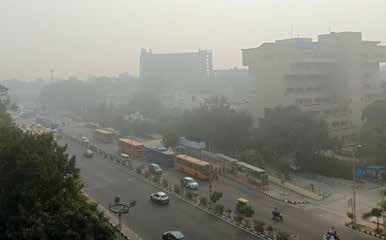The Graded Response Action Plan (GRAP), a series of measures aimed at combating air pollution in Delhi-NCR during winter, was activated on Sunday.
The Commission for Air Quality Management (CAQM), an independent body dedicated to enhancing air quality in Delhi and its neighboring regions, modified the GRAP last year and again in July.
The recent amendments involve stringent restrictions on the operation of aging vehicles and a complete prohibition on the use of coal and firewood in eateries, restaurants, and hotels when the Air Quality Index (AQI) surpasses the 200-mark.
If the AQI exceeds 400, BS-III petrol and BS-IV diesel four-wheelers will be immediately banned in Delhi and surrounding areas like Gurugram, Faridabad, Ghaziabad, and Gautam Buddh Nagar.
Established as a statutory body in 2021, the CAQM revised the GRAP in 2022 to ensure the proactive implementation of anti-air pollution measures based on forecasts up to three days in advance.
Previously, authorities would only implement these measures, such as a ban on construction and demolition, the entry of high-emission vehicles, and the use of coal and firewood, after pollution levels reached a specific threshold.
The GRAP for the National Capital Region (NCR) is categorized into four stages of adverse air quality in Delhi: Stage 1 – ‘poor’ (AQI 201-300); Stage 2 – ‘very poor’ (AQI 301-400); Stage 3 – ‘severe’ (AQI 401-450); and Stage 4 – ‘severe plus’ (AQI >450).
The revised GRAP advocates strict enforcement of the Supreme Court and National Green Tribunal orders on aging diesel and petrol vehicles under Stage 1. It also calls for a complete ban on the use of coal and firewood in eateries, restaurants, and hotels once the AQI crosses the 200 mark—a measure previously implemented under Stage 2.
New measures suggested in the updated GRAP include “strict action to curb air pollution at all identified hotspots in the region under Stage 2.”
During Stage 3, states are required to impose strict restrictions on the operation of BS-III petrol and BS-IV diesel four-wheelers in Delhi and surrounding areas. In such a scenario, the CAQM suggests the possibility of discontinuing physical classes in schools for children up to Class 5.
With an AQI above 450, four-wheelers registered outside Delhi, except electric vehicles and those using CNG and BS-VI diesel, will not be allowed to enter Delhi. However, exceptions will be made for those transporting essential commodities or providing essential services.
All other existing measures under different stages of GRAP will continue.
On Saturday, the CAQM reported that Delhi-NCR recorded an average AQI of 167 from January 1 to September 30, marking the second-best performance for the corresponding period in six years.
Better air quality during this period was only observed in the pandemic-affected year 2020. In 2022, 2021, 2019, and 2018, the average AQI ranged from 180 to 193 during this period.
Additionally, the CAQM has granted a three-month reprieve for the use of diesel generator sets in nine critical categories of emergency services, alleviating concerns about power disruptions in essential sectors in NCR. Earlier, it was stated that the ban on diesel generators, imposed every winter to mitigate air pollution, would also cover essential services.
(With PTI inputs)





